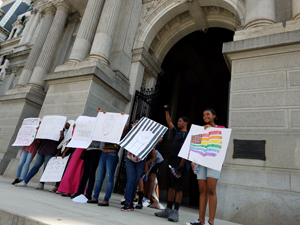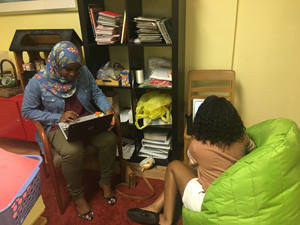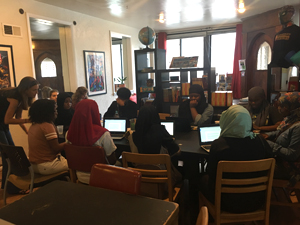 On August 12, a group of mostly African American, Muslim high school students stood in front of Philadelphia’s City Hall, waving handmade demonstration signs. One had drawn a raised, clenched fist, emerging from black bars. Another, a rainbow-colored American flag.
On August 12, a group of mostly African American, Muslim high school students stood in front of Philadelphia’s City Hall, waving handmade demonstration signs. One had drawn a raised, clenched fist, emerging from black bars. Another, a rainbow-colored American flag.
Four teens read aloud the group’s list of demands, which ranged from fully-funded schools to prison reform.
“…Nobody should be treated differently. We are all human, we all deserve the same equal rights…”
Two hundred and fifty miles away, in Charlottesville, Virginia, a different kind of protest was brewing. Not even 24 hours later, hundreds of torch-bearing white nationalists, neo-Nazis, and Ku Klux Klan members would descend upon the city to protest the removal of Confederate monuments across the South. A collision of protesters and counterprotesters would erupt in violence, leaving one person dead, 19 injured, and millions more angry, scared, and sad.
In the aftermath of tragedies like what occurred in Charlottesville, educators have the capacity to inspire collective action, starting in the classroom.
That’s exactly what author Peg Kern is doing at Mighty Writers, a nonprofit dedicated to teaching students ages 7–17 to think and write with clarity. From August 7–11, she led the organization’s first Power to the People! protest workshop.
 The students spent the first two days studying the platforms of historical and modern social movements, drawing inspiration from the Radical Monarchs, ACT UP, Sylvia Rivera, Angela Davis, the Black Panther Party, and Black Lives Matter, among others.
The students spent the first two days studying the platforms of historical and modern social movements, drawing inspiration from the Radical Monarchs, ACT UP, Sylvia Rivera, Angela Davis, the Black Panther Party, and Black Lives Matter, among others.
“I wanted to give them a deeper sense of the legacy of social movements and their place in those legacies.” said Kern. “We’ve always done a terrible job of teaching civic activism. This is critical, critical history, and you can’t step into your historical role if you don’t know who came before you.”
Kern asked the students to choose an issue they care about and to write a short paragraph expressing their point of view. She helped them weave their paragraphs into a three-page declaration that combined personal experience, history, and fact to assert their collective platform on education inequality, immigrant and racial profiling, sexual assault, police brutality, religious discrimination, mass incarceration, drug sentencing, healthcare access, and LGBTQIA rights.
The last lines of the declaration read “Welcome to Philadelphia. This is what we believe, what we want, and who we are.”
On the last day of the workshop, the students marched a mile down Broad Street to City Hall, where four volunteered to read the declaration.
Juwayriya Abdul-Hadi,15, chose to write about mass incarceration, an issue that has impacted her own family. She said she doesn’t often have opportunities to be heard by her teachers and classmates at Central High School, which enrolls more than 2,200 students.
 “I want people to understand that even though we’re young and people might not listen to us, we have a voice and we need to be heard too because we’re the next generation and people after us have to learn and be educated too,” Abdul-Hadi said.
“I want people to understand that even though we’re young and people might not listen to us, we have a voice and we need to be heard too because we’re the next generation and people after us have to learn and be educated too,” Abdul-Hadi said.
Most of the students had never attended a protest previously.
“This is the first time I’ve actually done something with a group of people, in front of City Hall or anywhere, really, saying what’s on my mind,” said 14-year-old Jayanna Taylor.
Kern said the students were nervous initially, but became more confident as they marched.
“They felt substantial,” she said. “They felt significant.”
Kern said she hopes the students left with a sense of ownership over their city and their fate, and the confidence to participate alongside the adults in their communities in future movements.
“I think this is survival skill. It always has been, in this country but especially now. It is necessary.”
Mighty Writers was founded in 2009 with the mission to teach kids to think clearly and write with clarity. The organization offers free programs for students from elementary through high school at centers in four diverse Philadelphia neighborhoods, including one bilingual location for Spanish-speaking students. Mighty Writers offers daily afterschool academies, long- and short-term writing classes nights and weekends, teen scholar programs, mentorships, College Prep courses and college essay writing classes. You can find them on Facebook, Twitter, and Instagram.